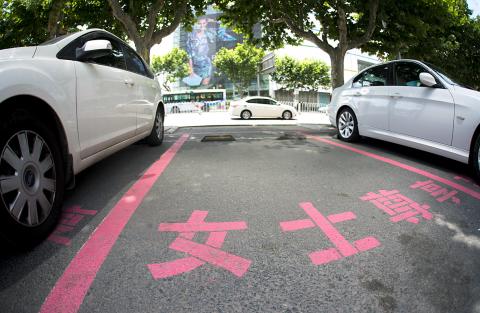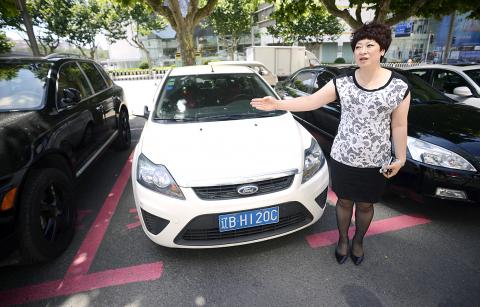The parking spaces outside a Chinese shopping mall are distinctive: marked out in pink, signposted “Respectfully reserved for women”, and around 30 centimeters wider than normal.
The slots at World Metropolis have sparked debate in China, which officially embraces gender equality but where old-fashioned sexism is rife in reality.
The mall, in the center of the northern port city of Dalian, has little to distinguish itself from thousands of other retail complexes that have sprouted across the country as part of a vast urbanization drive.

Photo: AFP
It boasts chain clothing stores, fast food franchises, glass lifts, a cinema and the inevitable Starbucks, a favorite hangout of China’s new middle class.
Unusually, the 10 spaces outside the main entrance were provided after women had trouble parking in the standard basement slots, managers said. “I think this is very convenient,” said user Yong Mei. “Other parking spaces are too narrow.”
“It’s not gender biased,” she told AFP. “It’s just that women have a few issues with vision when parking.”

Photo: AFP
But outraged commentators on Chinese social media accused the mall managers of sexism and cliched thinking.
“This is supposed to respect women, but actually it’s an insult,” said one.
The mall managers deny the allegation. “We just wanted to make things easier for women, who make up most of our customers,” said Yang Hongjun, a woman herself.
“It’s not an insult to women at all,” she added. “If their parking spaces are larger, it’s only for practical reasons. It doesn’t mean that women drive less well than men.”
HOLDING UP HALF THE SKY
Officially, China proclaims the sexes equal in keeping with Communist principles, and Mao Zedong (毛澤東) said that “women hold up half the sky.”
But conservative attitudes remain deeply ingrained, and women are conspicuous by their rarity in the upper echelons of Chinese politics and the ruling party, dominated by men in black suits.
One online poster on the Dalian car park said: “The two most dangerous things in the world are men who cook and women who drive.”
Manufacturers’ advertisements in the world’s biggest auto market are invariably aimed at male buyers, and a man at the mall, Wu Zhicun, said: “Women don’t really know how to park a car.”
“The few times I’ve come close to crashing was basically with women driving the other car,” he added. “I’ve noticed they’re a bit rough at the wheel, they only look forwards, too often they ignore their mirrors.”
But driving standards in China are often lamentable, regardless of which gender is at the wheel. According to state media reports, officials said 60,000 people died on the roads in 2012, the most recent figures available.
The parking initiative is not unprecedented — other countries have similar female-dedicated spaces, including South Korea and various European nations.
The latest Chinese controversy echoes a series of microblog posts Beijing police made last year advising women on driving techniques — including not wearing high heels, releasing the handbrake before setting off, and not panicking if they suddenly realize they’re going the wrong way.
“Some women drivers lack a sense of direction, and while driving a car, they often hesitate and are indecisive about which road they should take,” reads one of the entries on the police department’s verified microblog.
Another featured a cartoon depicting a confrontation between a police officer and a woman driving a vehicle shaped like a large red high-heel shoe.
According to a WHO estimate in March 2013, globally males are more likely to be involved in accidents than females, and 77 percent of all road traffic deaths occur among men. Even so, for some posters the Dalian parking places amounted to discrimination against male drivers. “It’s always women who enjoy privileges!” complained one. “Men have become the weaker sex.”

In the March 9 edition of the Taipei Times a piece by Ninon Godefroy ran with the headine “The quiet, gentle rhythm of Taiwan.” It started with the line “Taiwan is a small, humble place. There is no Eiffel Tower, no pyramids — no singular attraction that draws the world’s attention.” I laughed out loud at that. This was out of no disrespect for the author or the piece, which made some interesting analogies and good points about how both Din Tai Fung’s and Taiwan Semiconductor Manufacturing Co’s (TSMC, 台積電) meticulous attention to detail and quality are not quite up to

April 21 to April 27 Hsieh Er’s (謝娥) political fortunes were rising fast after she got out of jail and joined the Chinese Nationalist Party (KMT) in December 1945. Not only did she hold key positions in various committees, she was elected the only woman on the Taipei City Council and headed to Nanjing in 1946 as the sole Taiwanese female representative to the National Constituent Assembly. With the support of first lady Soong May-ling (宋美齡), she started the Taipei Women’s Association and Taiwan Provincial Women’s Association, where she

Chinese Nationalist Party (KMT) Chairman Eric Chu (朱立倫) hatched a bold plan to charge forward and seize the initiative when he held a protest in front of the Taipei City Prosecutors’ Office. Though risky, because illegal, its success would help tackle at least six problems facing both himself and the KMT. What he did not see coming was Taipei Mayor Chiang Wan-an (將萬安) tripping him up out of the gate. In spite of Chu being the most consequential and successful KMT chairman since the early 2010s — arguably saving the party from financial ruin and restoring its electoral viability —

It is one of the more remarkable facts of Taiwan history that it was never occupied or claimed by any of the numerous kingdoms of southern China — Han or otherwise — that lay just across the water from it. None of their brilliant ministers ever discovered that Taiwan was a “core interest” of the state whose annexation was “inevitable.” As Paul Kua notes in an excellent monograph laying out how the Portuguese gave Taiwan the name “Formosa,” the first Europeans to express an interest in occupying Taiwan were the Spanish. Tonio Andrade in his seminal work, How Taiwan Became Chinese,